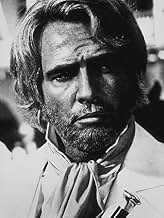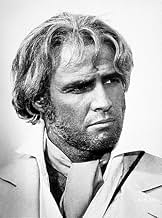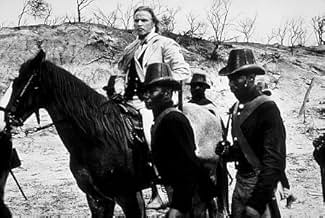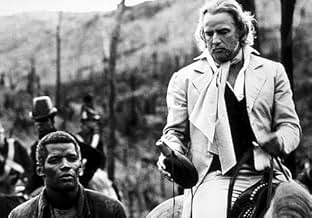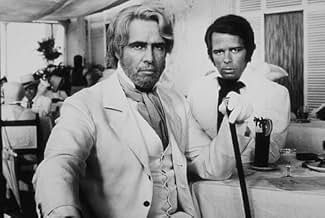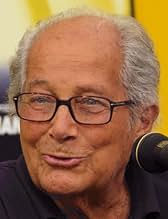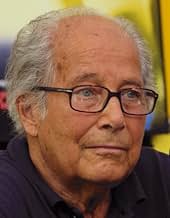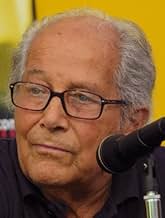Ajouter une intrigue dans votre langueIn 1844, a British mercenary helps the revolting slaves of an Antilles island colony gain independence from Portugal, but later returns to hunt down a local rebel leader and former protégé.In 1844, a British mercenary helps the revolting slaves of an Antilles island colony gain independence from Portugal, but later returns to hunt down a local rebel leader and former protégé.In 1844, a British mercenary helps the revolting slaves of an Antilles island colony gain independence from Portugal, but later returns to hunt down a local rebel leader and former protégé.
- Réalisation
- Scénario
- Casting principal
- Récompenses
- 5 victoires et 1 nomination au total
- José Dolores
- (as Evaristo Marquez)
- Juanito
- (as Joseph P. Persaud)
- Soldier
- (as Alvaro Medrano)
- Engl. Major
- (as Alejandro Obregon)
- Lady Bella
- (non crédité)
- Man on the ship
- (non crédité)
- Ramón
- (non crédité)
Avis à la une
Small wonder this film disappeared quickly from American screens. It's a no-punches-pulled, heady stuff even for the rebellious 1960's. Brando was always an anti-imperialist, and I suspect this film amounted to the one he long hoped to make, despite many years of bad choices. The movie itself remains an insight into the ugly realities behind the dressed-up facade of history books, proxy armies, and cosmetic governments. And although, not Brando's best performance (dialects never brought out his best), the screenplay stands as a testament to a political conviction which, despite the early years of McCarthy red-baiting, never wavered and even smouldered to artistic heights during that same period. ( Disregard Leonard Maltin's characterization of the film as "muddled"-- his staff apparently failed to follow the twists and turns of the power struggle, which, despite Maltin's myopia, pursues a reasoned course on all sides.) Then too, catch up with the uncut European version if you can.
It is impressive the timing of director Gillo Pontecorvo to make and release "Burn!". In 1969, the South America was under military dictatorships promoted by the United States of America to improve their economical and political interests in the region. There are many parallel situations in the colonization process between what was happening in South America in that historical moment and in the fictitious island of Queimada in the previous century. Marlon Brando performs one of the most Machiavellians characters of the cinema history and very similar to the American advisors that supported the foregoing dictatorships (despite not using torture). His character is fascinating as well as his political capability to envision the consequences of his actions; he is indeed the personification of the thoughts and concepts of Machiavelli in "The Prince". My only remark is the use of English language in a Portuguese colony; Mr. Pontecorvo should have casted actors that speak Portuguese to be more accurate. My vote is eight.
Title (Brazil): "Queimada!" ("Burn!")
Le saviez-vous
- AnecdotesMarlon Brando once said this film contains "the best acting I've ever done."
- GaffesPortugal never had any colonies in the Caribbean. Its only American colony, Brazil, has no coast in the Caribbean.
- Citations
Sir William Walker: Gentlemen, let me ask you a question. Now, my metaphor may seem a trifle impertinent, but I think it's very much to the point. Which do you prefer - or should I say, which do you find more convenient - a wife, or one of these mulatto girls? No, no, please don't misunderstand: I am talking strictly in terms of economics. What is the cost of the product? What is the product yield? The product, in this case, being love - uh, purely physical love, since sentiments obviously play no part in economics.
[general laughter]
Sir William Walker: Quite. Now, a wife must be provided with a home, with food, with dresses, with medical attention, etc, etc. You're obliged to keep her a whole lifetime even when she's grown old and perhaps a trifle unproductive. And then, of course, if you have the bad luck to survive her, you have to pay for the funeral!
[general laughter]
Sir William Walker: It's true, isn't it? Gentlemen, I know it's amusing, but those are the facts, aren't they? Now with a prostitute, on the other hand, it's quite a different matter, isn't it? You see, there's no need to lodge her or feed her, certainly no need to dress her or to bury her, thank God. She's yours only when you need her, you pay her only for that service, and you pay her by the hour! Which, gentlemen, is more important - and more convenient: a slave or a paid worker?
- Versions alternativesThe complete version of this film runs 132 minutes. A 112-minute version under the title "Burn!" was released in the USA and the UK.
- ConnexionsFeatured in Pontecorvo: The Dictatorship of Truth (1992)
Meilleurs choix
- How long is Burn!?Alimenté par Alexa
Détails
Box-office
- Montant brut aux États-Unis et au Canada
- 431 817 $US
- Durée2 heures 12 minutes
- Couleur
- Rapport de forme
- 1.66 : 1
Contribuer à cette page



